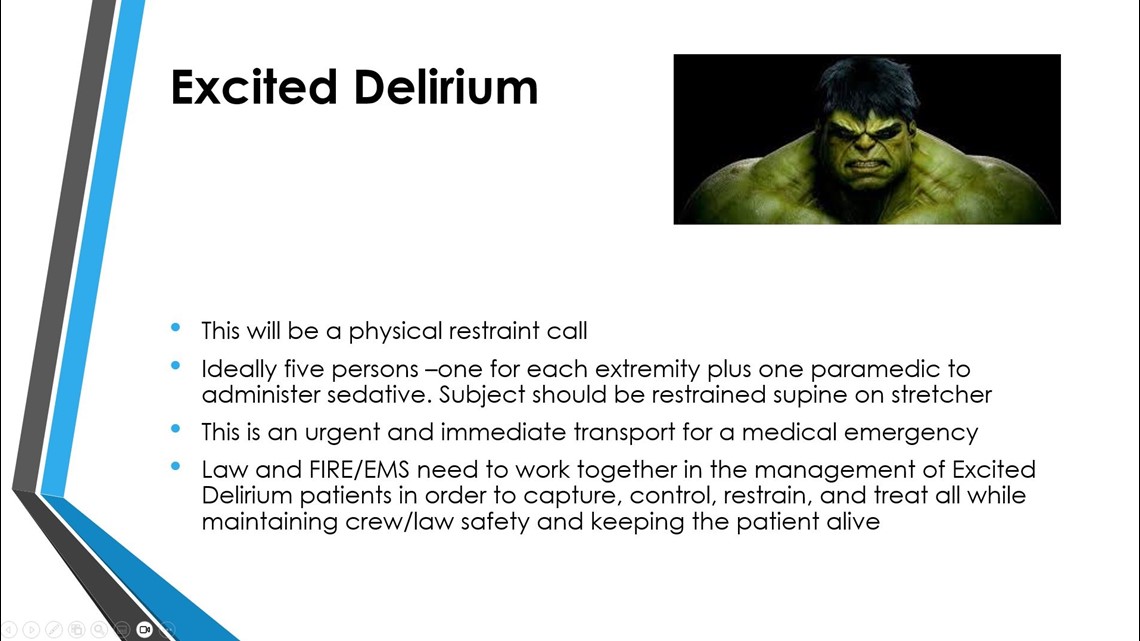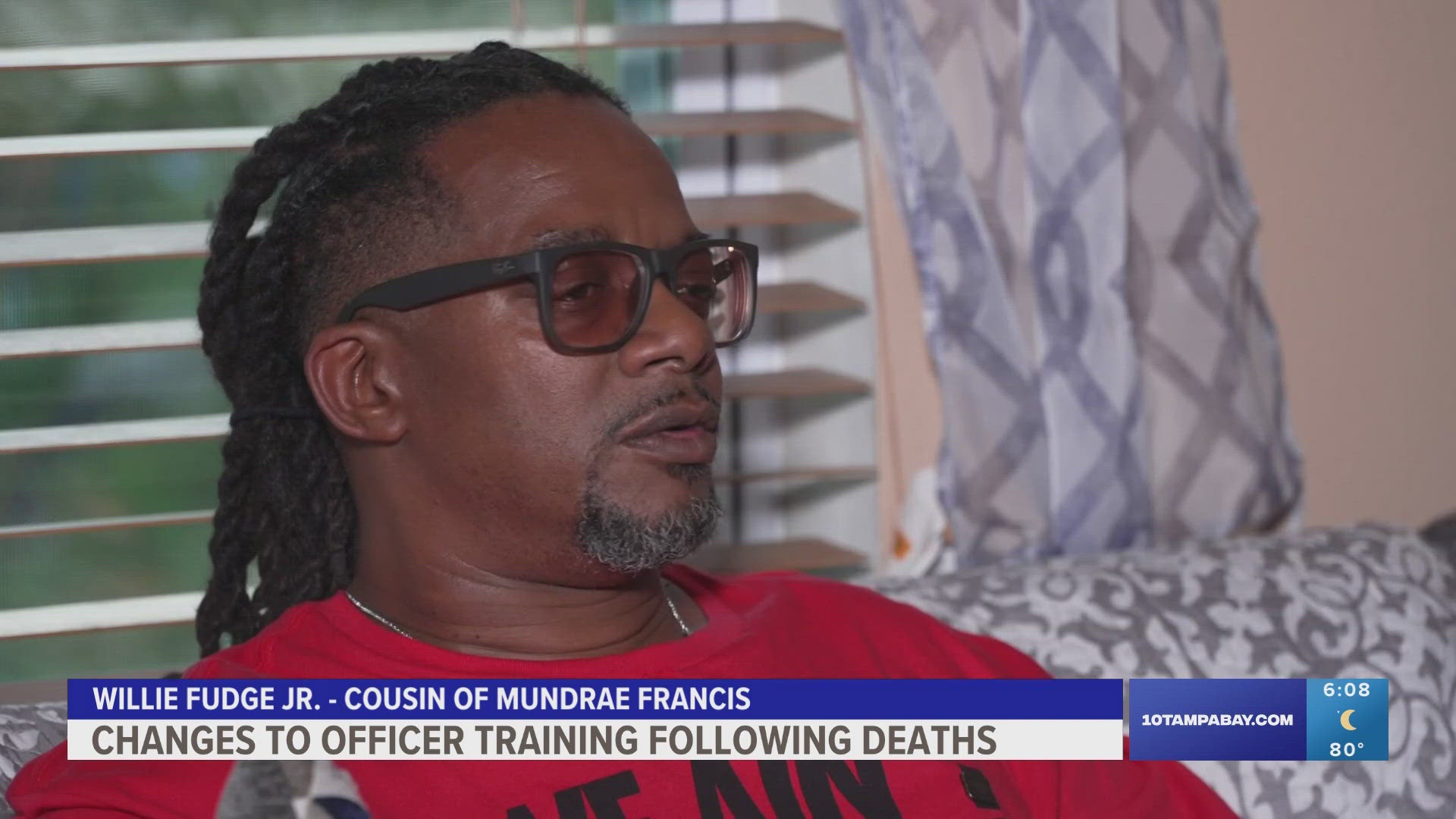LARGO, Fla. — Content warning: This story includes descriptions, images and videos of police using force on people who were struggling with their mental health and/or drug use.
New state training is teaching Florida law enforcement recruits to back off from getting hands-on when it comes to people experiencing a controversial group of symptoms called “excited delirium.”
“Excited delirium” is basically a theory that sometimes people can get so amped up and agitated that they just die.
The changes equate to the state reversing course on some of the go-to tactics it’s been teaching recruits for years.
Florida Department of Law Enforcement records show the state’s Criminal Justice Standards & Training Commission made these changes in 2023.
The new approach could save lives; but 10 Investigates found local law enforcement agencies are still teaching outdated info, which could put people who are in crisis at risk.
“We need an officer here right now.”
Willie Fudge Jr. still has questions about what led to his cousin’s death seven years ago.
“It’s just unexplained,” Fudge told 10 Investigates.


Paramedics took Mundrae Francis to Largo Medical Center for emergency mental health treatment on March 21, 2017.
When Fudge left Francis at the hospital, he says his cousin was calmly reading a Bible.
It didn’t last.
“This is the emergency department. We need an officer here right now, please. There’s a psych patient out of control,” a hospital staff member told the 911 dispatcher.
Reports from Largo Police reveal officers handcuffed Francis, restrained his ankles, shocked him with a Taser, and pepper sprayed him.
“He’s knocked several people to the ground and beat them. We have bloody employees,” another emergency room staff member told 911.
Hospital employees told police Francis went limp after staff injected him with an antipsychotic and a sedative.


A State Attorney’s Office report says “…the actions of the officers were lawful and they used ordinary caution and reasonable force.”
Largo Police turned down our request for an interview.
The medical examiner found blunt trauma, physical restraint, and asthma contributed to Francis’s death, but they labeled his cause of death “Excited Delirium Syndrome.”
Fudge said he and his family had never heard of “excited delirium” until our interview. He told us it made him feel “like [it’s] a cover-up.”


What is “excited delirium?”
Six years after Francis died, the state made changes to how it trains officers to handle cases like his.
“Excited delirium” or “hyperactive delirium” has been characterized over the years as a sudden state that can involve agitation, confusion, paranoia, hyperactivity, hallucinations, high body temperature, sweating, and incoherent shouting.
It’s sometimes reported in people who use stimulant drugs like coke or meth, sometimes in people with mental health problems. Sometimes none of the above.
Every major medical organization has now turned its back on “excited delirium.”
Forensic epidemiologist Dr. Michael Freeman co-authored a 2020 study that found, “There is no existing evidence that indicates that EXDS [Excited Delirium Syndrome] is inherently lethal in the absence of aggressive restraint.”
“When there’s law enforcement involved and the death occurs during restraint, that’s when the term ‘excited delirium’ is invoked,” Freeman said.
But police are still being trained that it’s real and they need to be ready for it.
In November, 10 Investigates uncovered that Florida medical examiners identified “excited delirium” as the official cause of death or contributing factor for 78 people since 2010.
At least 81% died after law enforcement used force, restraint, or both.
Can't see the embedded database? Click or tap here
The state changes recruit training
10 Investigates has learned the state made big changes to its basic recruit training on “excited delirium” last year.
FDLE provided us records showing Florida’s Criminal Justice Standards & Training Commission reversed course on its go-to instruction: To Taser and restrain those people while they wait for paramedics to arrive.
Instead, the updated training says, “Remove excess stimuli by turning off lights and sirens” and “Possible containment in a controlled and safe environment can ensure safety for everyone while the incident runs its course prior to EMS arrival.”


The revised training no longer describes “excited delirium” as a life-or-death situation or connects it to “Sudden In Custody Death Syndrome” – something it’s done for years.
FDLE backed out of two scheduled on-camera interviews with us about these training changes.
We drove to their headquarters in Tallahassee to try to get answers. We asked to speak to FDLE Commissioner Mark Glass.
A sergeant told us Glass was unavailable, but he would pass along our information. We have not heard back from the commissioner.
FDLE’s communications department answered our questions over email.
“The changes… were made to the curriculum in 2023 at the recommendation of the subject matter experts… a mix of medical doctors, criminal justice officers, medical first responders, and instructors,” Communications Coordinator Dana Kelly told us in an email.
What about officers already working here?
So, the state updated its training for recruits, but what about all the officers already working in our local law enforcement?
We reviewed the training and policies on “excited delirium” for 10 of our Tampa Bay area agencies and found they largely had not made changes like the ones the state made last year.
For the most part, local training is consistent with the state’s outdated recommendations – encouraging officers to Taser and restrain people so they can get medical treatment, and warning that they might suddenly die.
The Hardee County Sheriff’s Office was still using the training from the state’s old Florida Basic Recruit Training Program textbook until we started asking questions. The agency has now switched to the updated version.
The Hillsborough County Sheriff’s Office’s Crisis Intervention Training Lesson Plan says to “… Have one deputy’s agency issued taser at the ready.” The lesson plan is more than a decade old, dated 2013.
HCSO also sent us a Crisis Intervention Training video recorded in 2020 that they use during annual in-service training.
“Hands-on with the subject is usually unavoidable, so have as many deputies available to you as possible,” Master Dep. Dave Hoffman says in the recording. “The subject may stop breathing, so be prepared for this. There’s usually a high death rate associated with excited delirium at the end.”
Sarasota Police use Crisis Intervention Team Training taught by an outside company: Kenniff Training & Consulting.
The company’s training PowerPoint uses a picture of the Hulk – the Marvel comic book and movie character – on a slide about “excited delirium.”


It also says, “This will be a physical restraint call” and “the risk for death is imminent.”
The owner of that training company, Charles Kenniff, wouldn’t meet us for an interview but agreed to talk on the phone.
He justified using an image of the Hulk by saying officers need to learn that they’re dealing with someone who’s losing control, but the situation can be de-escalated – like how Black Widow is able to calm the Hulk in the Marvel movies.
Sarasota Police turned down our request to interview Chief Rex Troche about the training.
Too late for dozens of families
For dozens of Florida families, it’s too late for policy changes.
Mundrae Francis’s family won’t get him back.
Fudge said he’ll always remember his cousin as an outgoing football player who loved his kids.
“I miss his laughter. I miss his presence,” he said.
Seven years after Francis’s death, his family isn’t holding their breath for accountability.
“Every last one of them that was there and had something to do with him being restrained like that – when he’s there to get help, and y’all wind up hurting him?” said Fudge.
Last year, California became the first state to pass a law banning medical examiners from listing “excited delirium” as a cause of death.

